|
Hill Top Foundry Wednesbury was once well
known for two industries, tube making and edge tools,
both of which played a part in the early history of Hill
Top Foundry. One of the country’s leading edge tool
makers, Edward Elwell, based at Wednesbury Forge, had an
uncle, also named Edward Elwell, who established the
West Bromwich branch of the family, and founded the
original factory on the site. Edward’s factory consisted
of an ironworks and foundry which produced cast iron
holloware.
Around 1850, the 30 acre site was
acquired by five people who were partners in a new
tube-making company. One of them, Thomas Foster had
previously worked for James Russell at the Crown Tube
Works, on the High Bullen. He left after Russell’s death
in 1849. Two of the partners with the surname Brown put
up most of the capital. One of the other partners named
Cuxon ran the business with Thomas Foster. The factory
became known as the "The Old Patent Tube Works". Some of
the locals called it "Anchor Works" because of the
company’s anchor logo which was prominently displayed on
the front of the building. Others knew it as “Browns”
after the name of the two brothers who had supplied much
of the capital.
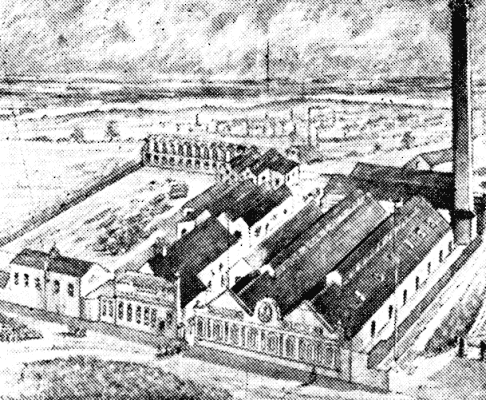
The Old Patent Tube Works in 1862.
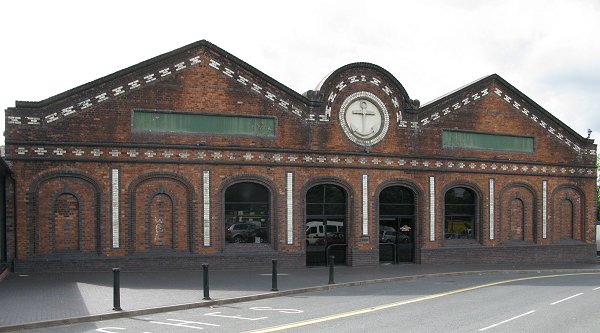
Part of the original frontage of
The Old Patent Tube Works at the Black Country Living Museum.
The business initially seems to
have been quite successful, but in 1875 it failed,
possibly due to the depression at the time, or possibly,
as tradition has it, that while Foster was away in
France commissioning a new tube mill, Cuxon mismanaged
the business. Whatever the cause, Foster was left to
repay the firm’s debts. It took him 8 years to pay-off
the creditors.
|
|
The factory was then acquired by
John Russell, James Russell’s younger brother, who had
moved from his factory at Church Hill.
The company also
opened a new tube works at Runcorn, and built a new tube
works at the Hill Top site. The new venture was
unsuccessful and the company sold out to Stewarts and
Lloyds in 1929.
In 1934 the site was acquired by
the Hill Top Foundry Company Limited, which was founded
in 1799 at Hawkes Lane, Hill Top, West Bromwich. By the
early 1930s orders were pouring-in and the firm found it
difficult to cope in their relatively small factory.
In order to cope with the
overflowing order book, the company had to increase
production, and so the much larger Old Patent Tube Works
in Smith Road would be ideal.
The firm purchased the factory (which was extended
to cover four acres), as well as thirty acres of
surrounding land. The facilities were
ideal. A railway siding ran alongside the casting shops
at cupola level, so that pig iron and coke could be
directly transferred from railway wagons to the cupola
platforms. The transfer of molten metal from the cupolas
to the various foundries was assisted by the addition of
overhead runways and electric cranes. |
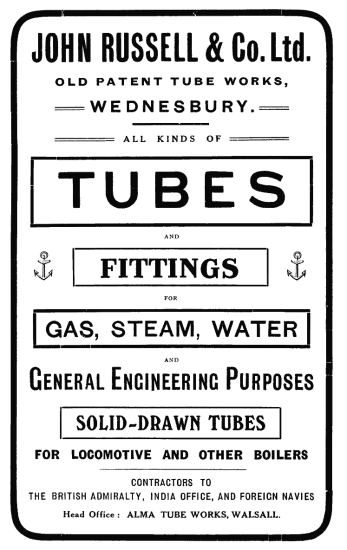
An advert from 1918. |
|
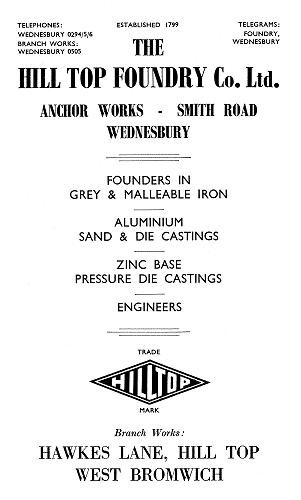
An advert from 1949. |
The heavy
foundry specialised in machine tool castings up to six
tons in weight, another section produced electrical,
general, and repetition castings. The self-contained
malleable foundry produced castings from a few ounces up
to 1½ hundredweights, and
used pulverised fuel to anneal them. The aluminium
foundry, also self-contained, produced casting from a
few ounces up to 400 pounds in weight, in a variety of
alloys, to suit the customer's requirements. There were
also die departments for the production of zinc
base and aluminium alloy pressure castings.
Casting sand was almost
entirely mechanically handled from its loading into
rotary screens to the storage bins in the different
departments. The sand mixing part of the process, in
which any foreign matter was removed, and the various
sands were mixed and aerated, and the moisture content
stabilised, was laboratory controlled throughout. The
engineering department which carried out general
machining to customer's requirements, produced its own
tools, dies, and jigs, and also manufactured a range of
machines, including grinding and moulding machines that
were used in the factory, and also sold to other
foundries, both at home and abroad. Other manufactured
items included domestic weighing machines and scales
which were produced in the light assembly and hardware
department.
|
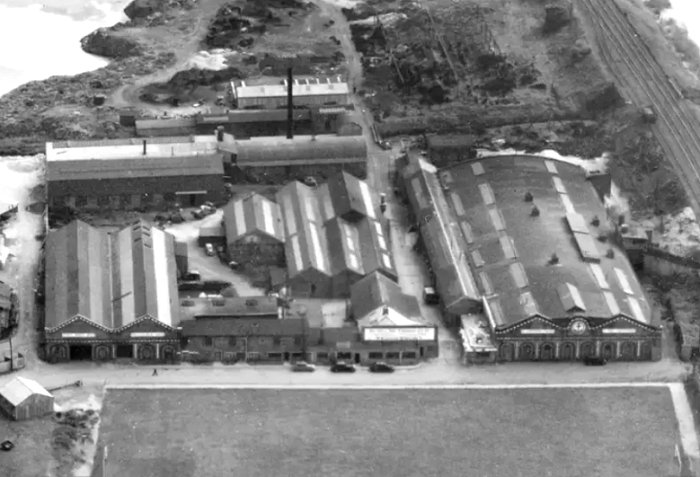
Hill Top Foundry in 1949.
|
In the early 1950s the
core shops were extended to cope with increasing demand,
and were fitted with the latest coke-fired,
thermostatically-controlled drying stoves. Other
departments included a drawing office, a well-equipped
pattern shop for the production of patterns in wood and
metal, and a laboratory where raw materials could be
analysed, along with various processes in the works.
New production methods
were always adopted where possible to comply with the
company's policy of "being right up-to-date", and
castings were supplied to many industries including
engineering, lighting, electrical manufacturing,
agriculture, transport, and domestic appliances. |
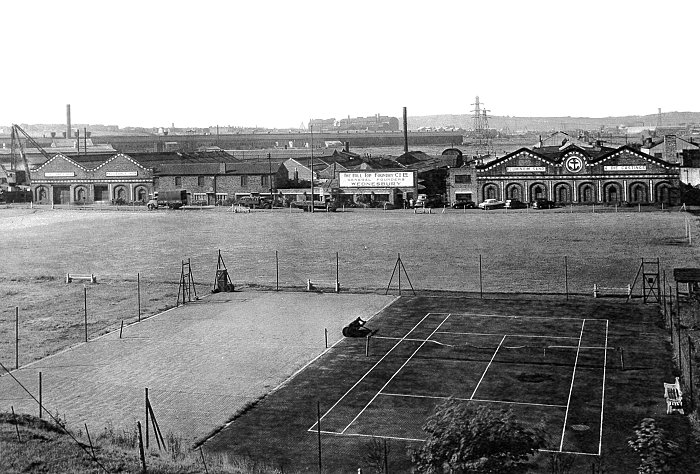
Hill Top Foundry.
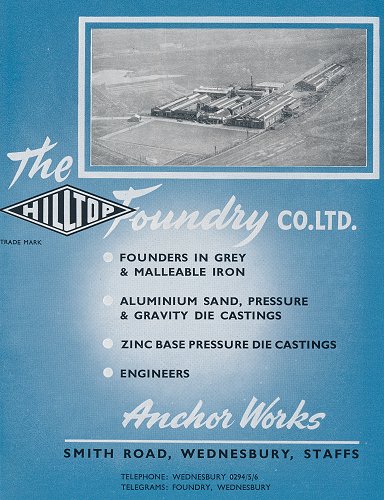
An advert from 1954.
|
In more recent times the factory
became part of Associated Electrical Industries (AEI),
which was taken over by GEC in 1967. Many of the
castings produced at the time were for AEI and GEC
products, such as motors, generators, and transformers.

A letterhead from the early 1950s.

A letterhead from 1978.
It still survives today as Newby
Industries Limited, producing high quality castings, and
specialising in rapid prototyping. Two other businesses
now occupy parts of the Smith Road site. They are Top
Tubes Limited, and Sunlight, a supplier of workwear.
|
|
 |
Return to the
previous page |
|